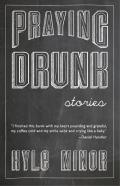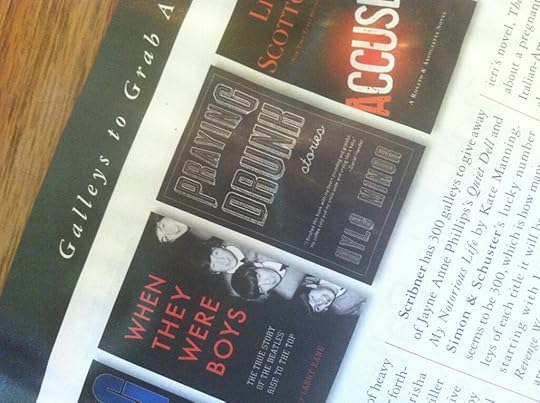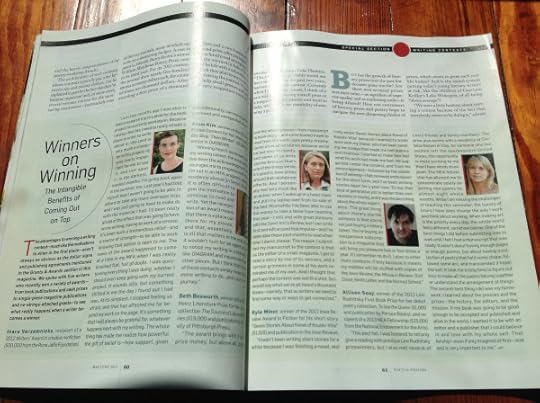Kyle Minor's Blog, page 4
December 9, 2013
Second Praying Drunk Review is In
November 25, 2013
Praying Drunk (shot glasses) in the L.A. Times
My beloved publisher and publicist commissioned these beautiful Praying Drunk shot glasses as a way to promote the book, and yesterday Carolyn Kellogg at the Los Angeles Times wrote a piece about them titled “How to make sure a book has a shot at getting noticed“:
Minor’s work has been widely published — in “Best American Nonrequired Reading 2013,” The Southern Review, “Best American Mystery Stories 2008,” “Twentysomething Essays by Twentysomething Writers,” and Forty Stories: New Voices from Harper Perennial” — and he’s received a number of prizes and accolades. But it’s hard for someone who writes mostly short fiction to break through — perhaps “Praying Drunk,” his second collection, will reach a wider audience.”
I hope she’s right! It took ten years to write the book. I hope readers do find and enjoy it.
UPDATE: Because of the unexpected demand for the shot glasses, Sarabande is now selling them on their website: http://www.sarabandebooks.org/?page_id=10604


October 13, 2013
Story-Making and Dead French and Germans
Knowing that, and looking for tools and pathways, what a pleasure it has been to discover that there were a bunch of French and German people who were pursuing that question as a life's calling, and writing about it in ways that help me better construct interior lives like and not like my own. That they were called phenomenologists doesn't intimidate me in the least, although I bet I would have come to them a lot sooner if in English we called them something like "thinkers about consciousness."
And they don't all agree, and they range widely in the direction of adjacent fields, and there are a bunch of them -- so far: Bachelard, Heidegger, Marleau-Ponty, Husserl. Walter Benjamin has a few things to say about these matters, too, and then you read, say, the new Best American Essays, or a new Howard Norman book, or a Philip Roth novel from the '90's, or Virginia Woolf, or Faulkner, or Toni Morrison, or Cheever, or Moby-Dick, and you see that the preoccupations haven't changed, nor has the breadth of their possible modulation been explored in every direction, even though so many directions have been explored.
It's an exciting time in my reading life, and I feel grateful to the used bookstore in Iowa City that left open a copy of The Poetics of Reverie, which caused me to purchase a new copy of The Poetics of Space, a book I had read before I was ready to read it, but now I'm ready. With some of these other writers, I wonder if I'm ready, but you're always ready to stretch, to try, to prime the pump. The word "theory" seems too small to account for all the practical juice it takes so little to wring from these good things.
- Kyle Minor, October 13, 2013
P.S. - And all along my bookshelves were full of hidden-in-broad-daylight catalogs of theory by other names (novels, story and essay collections, books of poetry, etc.) doing adjacent work: Suttree, by Cormac McCarthy; Open Secrets, by Alice Munro; The Stories of John Cheever, The Collected Poems of Lucille Clifton; Tomorrow in the Battle Think On Me, by Javier Marias; Deep River, by Shusaku Endo; The Vagrants, by Yiyun Li; The Borrowers, by Mary Norton; Duma Key, by Stephen King; The Wapshot Chronicle, by John Cheever; American Pastoral, by Philip Roth; "Meneseteung" and "Friend of My Youth," by Alice Munro; Carpenters Gothic, by William Gaddis; The Collected Poems of Wislawa Szymborska; Vermeer in Bosnia, by Lawrence Weschler; many of the books and essays of Rebecca Solnit; We Tell Ourselves Stories in Order to Live, by Joan Didion; Fay, by Larry Brown; Notes from No Man's Land, by Eula Biss; entrance to a colonial pageant in which we all begin to intricate., by Johannes Goransson; U and I, by Nicholson Baker; The Collectors, by Matt Bell; Big World, by Mary Miller; the essays of George Orwell; so much of Virginia Woolf; The Zombie Survival Guide, by Max Brooks; Mr. Sammler's Planet, by Saul Bellow; This Way for the Gas, Ladies and Gentlemen, by Tadeusz Borowski; The Stories of Isaac Bashevis Singer; Whites and Mating, by Norman Rush; Demon Camp, by Jennifer Percy; so much of Lenny Bruce and Richard Price and Hubert Selby; Slaughterhouse-Five, by Kurt Vonnegut; most of Susan Sontag; One Hundred Years of Solitude and Chronicle of a Death Foretold, by Gabriel Garcia-Marquez; Invisible Man, by Ralph Ellison; "We Didn't," by Stuart Dybek; "The Solutions to Brian's Problem," by Bonnie Jo Campbell; the I. series, by Stephen Dixon; "The Talk Talked Between Worms," by Lee K. Abbott; "Sonny's Blues," by James Baldwin; "People Like That Are the Only People Here," by Lorrie Moore; "Lust," by Susan Minot; "Bullet to the Brain," by Tobias Wolff, Happy Baby, by Stephen Elliott; the fictions of Borges; Lydia Davis; "Chixulub," by TC Boyle; Levels of the Game, by John McPhee; so many of the poems of James Wright, Sharon Olds, Wallace Stevens, Frank Stanford, Rilke, Rodney Jones, Dante, Maurice Manning, Andrew Hudgins, Bill Knott, Sylvia Plath, CD Wright, e.e. cummings; "Love and Honour and Pity and Pride and Compassion and Sacrifice," by Nam Le; "Dirty Places, Dirty Things," by Jamie Renda; "Proof of God," by Holly Goddard Jones; "Against Specificity," by Douglas Watson; "Sarah Cole: A Love Story," by Russell Banks; The Affairs of Others, by Amy Grace Loyd, "Good Old Neon," by David Foster Wallace; the Rabbit Tetralogy; "Girls in the Grass," by Melanie Rae Thon; "Ring of Brightest Angels Around Heaven," by Rick Moody; all of Sebald's novels; many of Bernhard's; The Decameron; tidy three-acts that add up to a terrible argument such as Coetzee's Disgrace or Bernhard Schlinck's The Reader; so much of Kundera; Jesus' Son, by Denis Johnson; Bats Out of Hell, by Barry Hannah; so many of the dead Russians; Tim O'Brien's The Things They Carried; Joyce Carol Oates's miniature stories in Where Is Here? and The Assignation; Beloved, by Toni Morrison; the collected Grace Paley; so much of Leonard Michaels; James Alan McPherson's Hue and Cry; J.F. Powers's priests; Annie Proulx's Close Range stories; the first page of Louise Erdrich's Plague of Doves; Peter Taylor's The Old Forest; the better of the criticism of Charles Baxter and James Wood and Joan Silber and Claudia Pierpont Roth and Frank Kermode and Chinua Achebe and Edward Said and John Berger; the rhizome talk of Deleuze and Guattari; Cynthia Ozick's The Shawl; The Book of Genesis and The Book of Revelation and The Book of Ecclesiastes; The Illiad and The Odyssey; Dante's Inferno; Beowulf; the Bhagavad-Gita; Saint Augustine's Confessions versus Doctorow's City of God; of course Shakespeare.
There: A reading list.
October 9, 2013
Praying Drunk ZERO DOLLAR TOUR
August 29, 2013
Praying Drunk (shot glasses) in the L.A. Times
My beloved publisher and publicist commissioned these beautiful Praying Drunk shot glasses as a way to promote the book, and yesterday Carolyn Kellogg at the Los Angeles Times wrote a piece about them titled “How to make sure a book has a shot at getting noticed“:
Minor’s work has been widely published — in “Best American Nonrequired Reading 2013,” The Southern Review, “Best American Mystery Stories 2008,” “Twentysomething Essays by Twentysomething Writers,” and Forty Stories: New Voices from Harper Perennial” — and he’s received a number of prizes and accolades. But it’s hard for someone who writes mostly short fiction to break through — perhaps “Praying Drunk,” his second collection, will reach a wider audience.”
I hope she’s right! It took ten years to write the book. I hope readers do find and enjoy it.


July 31, 2013
Magazine Days
I don’t post much here about my magazine and Internet writing, but it’s been a good season for all of it. I’m working now on essays and reportage for The Nation and The Believer, the first time I’ve worked with either magazine. And for the last eight months, I’ve been writing The Listener, an audiobooks column, for Salon.com, alternating weeks with the great critic Laura Miller. Salon also asked me to write a rebuttal to the (usually sharp) critic Christian Lorentzen’s takedown of Alice Munro in the London Review of Books. It was controversial, and I was pleased when it went viral. You can read it here. An excerpt:
These are lines one could imagine John Updike or F. Scott Fitzgerald being proud to have written, and they rise up with such force that the reader has the impression of a lifting, up off the page, a transport to mirror Rose’s sexual transport. This effect that couldn’t be any further from the dull constancy Lorentzen accuses Munro of evidencing “like butterscotch pudding on the boil,” a line he borrows from a description of the deadly Peregrine River in the title story from “The Love of a Good Woman.” I suppose he means to deliver it as an insult, but the metaphor doesn’t hold. There is nothing of dull constancy in the Peregrine River, which is at the moment “barely back within its banks” after the destruction of the yearly flood, and which, if you fell into it, “would freeze our blood and fling you out into the lake, if it didn’t brain you against the buttresses first.” These, I suppose, are the sorts of sentences that are “perfectly polished” and “perfectly humorless,” but, if so, many other writers might say: Let me be shiny and let nobody laugh.
Tin House ran an interview I did with Andrew Sean Greer last month on their website (read it here). They titled the piece “A Thimblerig of Time,” after a line from The Impossible Lives of Greta Wells. An excerpt:
Andrew Sean Greer: As a writer, you can decide to cheat it and just build new walls. Or you can take a deep breath—and start all over. Twice. Three times. I wanted readers never to be lost, so I tried to give simple visual clues instead of long descriptions—I think those come across as anxiety. So does historical information. I ended up with a wall of cork board, covered in pins and index cards and string. I transferred that to butcher paper with colored markers. I’ve never worked that way before but it allowed me to see the entire novel almost as a scroll of sheet music. Honestly, the structure of piece didn’t fall into place until almost the last minute—about four months before I turned the book in! Crazy, eh? But by then I had memorized it all, and could shift things around like a puzzle you have been staring at all afternoon. Until at last you see it all.
And I enjoyed reviewing Bennett Sims’s not-really-a-zombie-novel A Questionable Shape for HTMLGiant, in a review titled “What do I do with my memories, my longings, my hurts, the things unresolved between us?” An excerpt:
There is something more to say about the tonal naivete of the narrator. There is no failure of intelligence here. There is no lack of planning, of preparedness, of effort, of willful engagement with the world. There is, instead, a kind of appealing thing one sometimes sees (or experiences) in life, but seldom sees in literature: The narrator seems to be a person for whom certain varieties of human interaction are a little foreign, or at least for whom social skills, social cues, group dynamics, and so on, don’t come easily, but for whom these things are studyable, replicable, tryable, doable. The mind, which resides inside a young adult, is just becoming able to open itself, developmentally, to things that the peer group probably figured out earlier, and there is a corresponding and often beautiful sense of wonder at what is gradually made known to be part of the possibility of the world. The feeling it provokes in the reader is powerful: Suddenly, empathy is possible. Suddenly, romantic love is possible. Suddenly, the world is flush with color.


July 8, 2013
First Praying Drunk Review is In!
Praying Drunk isn’t out until February 2014, but the first review is already in, from Publishers Weekly, which calls it a “dazzling, emotional, funny, captivating puzzle.” I’m happy with that!
An excerpt: “Similar to a great magic trick, the 13 stories in Minor’s (In the Devil’s Territory) latest lure reader investment with strong visuals while simultaneously pulling the rug out from underfoot with clever, literary sleights–of-hand. Though not necessarily linked in the traditional sense, there is a sequential order to the collection—ideas, locations, incidents, and characters echo as the volume chugs forward—and the result is an often dazzling, emotional, funny, captivating puzzle.”


June 22, 2013
Unbound: Fiction on the Radio
Louisville Public Media invited me to read my story “The Question of Where We Begin” for the inaugural season of Unbound: Fiction on the Radio, produced by Erin Keane. The episode, titled “Alternate Histories,” debuted on June 21. It also includes a story by Tania James and music by Will Oldham (Bonnie Prince Billy) and Telephobia. It is now streaming live on the Unbound page at WFPL.org.


May 9, 2013
Publishers Weekly / BookExpo America
Good news today: Publishers Weekly chose Praying Drunk as one of 20 “galleys to grab” at BookExpo America, the four-day conference and party for American booksellers, librarians, publishers, critics, agents, book scouts, and journalists.


April 22, 2013
Poets & Writers
The new Poets & Writers arrived, and, hey!, I got to talk about The Iowa Review and my friend Aaron Gwyn. The photo was taken by Jen Percy at the Raymond Carver desk in Iowa City.

















